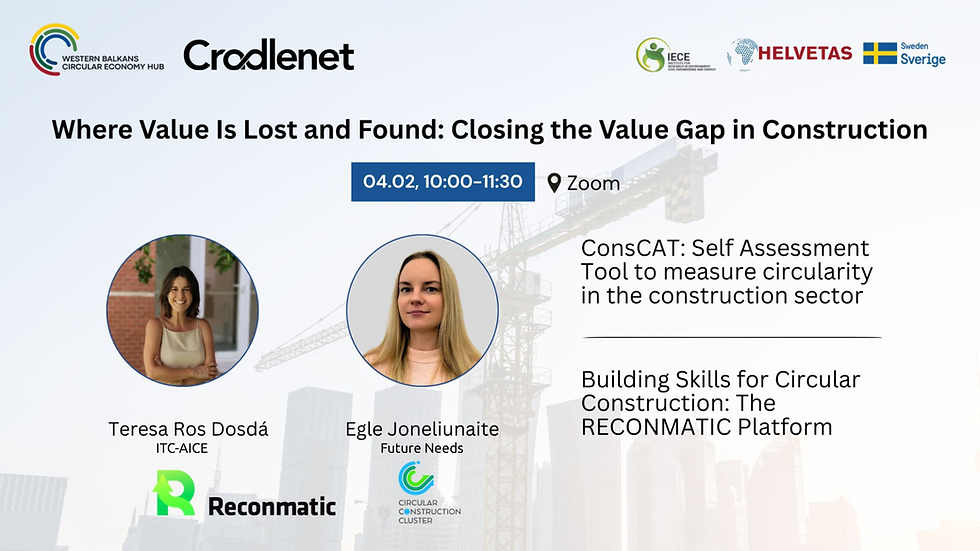1st Open Air Cities International Conference: Boosting confidence in CDW management
- Mar 13, 2024
- 3 min read
Updated: Apr 3, 2024

The 1st Open Air Cities International Conference entitled “Local and Regional Sustainable Development and Urban Reconstruction” on 16-18 February 2024, offered a great opportunity to get people's attention closer to our work in the RECONMATIC project. Namely, our Greek partner, ANAKEM S.A., participated in this event dedicated to the sustainable development of cities and regions, by presenting a scientific paper entitled “Boosting confidence in circular construction and demolition waste management: a DPSIR framework analysis”.
The paper describes the development of a DPRIR (drivers, pressures, state, impact, and response model of intervention analysis) based on the RECONMATIC project implementation data, providing a causal model that describes interactions between society and the environment. The full paper will be included in the conference proceedings, peer-reviewed and published in the international journal “Sustainable Development, Culture, Traditions Journal” (www.sdct-journal.com) (ISSN: 2241-4010). It was authored by ANAKEM’s team, Anna Michou (MSc, ANAKEM SA Collective System for Alternative Management), Ilias Dimitriadis (MSc, ANAKEM SA Collective System for Alternative Management), Olga Lampri (MSc, ANAKEM SA Collective System for Alternative Management) and Aggelos Tsaligopoulos (Ph.D., University of the Aegean).

The paper’s abstract
The construction industry ranks among the largest consumers of raw materials, including non-renewable resources and minerals. Within the European Union, over one-third of waste originates from construction and demolition activities, including road planning and maintenance. This waste, comprising a diverse range of materials such as concrete, bricks, wood, glass, and metals, is categorized as Construction and Demolition Waste (CDW). The Waste Framework Directive (2008/98/EC) addresses numerous environmental and sustainability issues arising from CDW mismanagement, including environmental pollution, resource depletion, increased energy consumption, and higher economic costs. In light of the global shift toward a circular economy, the potential for reusing CDW has gained prominence. Nonetheless, obstacles hinder the integration of recycled CDW into a circular economy framework. A persistent lack of confidence in the quality parameters and reliability of recycled CDW persists, leading to continued landfilling and illegal disposal.
The primary objective of this research is to investigate the underlying causes of this confidence deficit and foster trust among stakeholders and society. The study utilizes the DPSIR framework (Driving forces, Pressures, State, Impact, Response), a causal model that describes interactions between society and the environment. In this research, two driving forces influencing social activities and their environmental impact are examined. Firstly, the need to align with the circular economy framework and support the renovation wave to enhance building sustainability is assessed. Secondly, the societal necessity for urban development and building construction is examined. In both cases, the response involves supporting more sustainable CDW management and its reintegration into construction practices.
The DPSIR framework elucidates the CDW generation process, highlights associated pressures, and suggests responses. Importantly, it offers valuable insights to policymakers aiming for a more sustainable and circular built environment. (Source: https://www.openaircities.org/book-of-abstracts/, p.77)
Have a look in the book of abstracts where the conference provides for an overview of al the topics and the papers presented, and stay tuned for the full paper. Subscribe to our newsletter to receive the news about all our activities directly in your inbox.
More about the 1st OPEN-AIR CITIES International Conference

The 1st OPEN-AIR CITIES International Conference, jointly hosted by Open-Air Cities, the HAROKOPIO UNIVERSITY of Athens - Postgraduate Programme "Sustainable Development," the SYROS INSTITUTE, and in collaboration with the Municipality of KALLITHEA in Athens, aimed to showcase and disseminate research findings concerning the Sustainable Development of urban and regional areas on a global scale. The primary focus lies in the presentation of pertinent research within the realm of Sustainable Development, structured around the four foundational pillars: Environment, Economy, Society, and Culture, which also serve as the cornerstones of Urban and Regional Development. Each pillar encompassed its respective subcategories, elaborated upon through thematic sections aligned with the 17 Global Goals of Sustainable Development. The conference convened esteemed researchers in Local and Regional Sustainable Development as well as Urban Reconstruction from diverse nations worldwide. Attendees seized the opportunity to unveil novel research, exchange insights, and deliberate on contemporary challenges.


